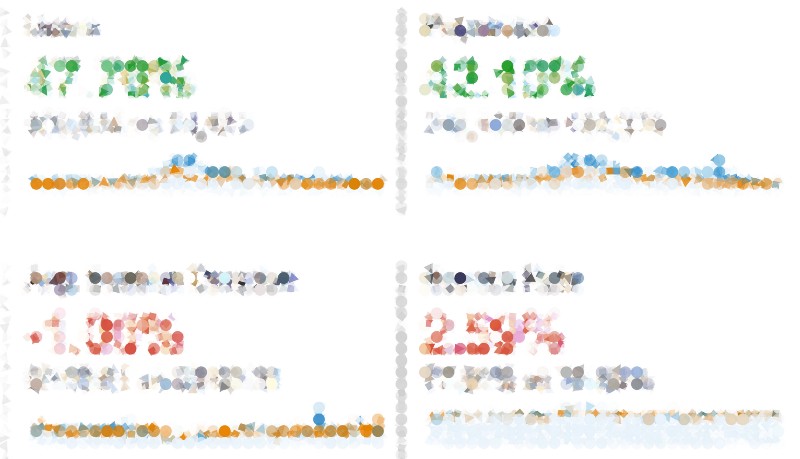June 18, 2016

I Am Data Drivel
Quit Google Analytics With Me
Last year I wrote about an update to my Ghost-O-Meter app that removed Google Analytics. That post was written to my users, but now I want to talk to my fellow creators. I want you to consider unplugging your data vacuums. It sounds crazy, but stick with me.
I know you care about your users. Part of the reason you add analytics to your app is precisely because you care. You want to know how they use your app. You want to uncover areas for improvement. We crave validation of our decisions. Your business depends on revenue and you want to optimize, optimize, optimize. I get that.
Here is what I am suggesting:
I want to challenge you to eliminate, or at lease minimize, the analytics tracking that you bake into your apps and websites. This is blasphemy, I know. It goes against the data-driven mantra that we have tattooed in our DNA.
But the inclusion of tracking code in our app is getting harder to justify. You can’t go a week without hearing some story about massive privacy breaches. Apple’s foray into allowing ad blocking has sparked a rebellion against ads and any code that might increase page loading speed. And of course there is the whole Edward Snowden scandal.

This is the climate that your app is being released into. The public is hyper- sensitive to anything that has a whiff of privacy invasion. With that in mind, you should think long and hard about the tracking code embedded in your app or website.
“Marketing told me to do it” is not a good enough excuse.
“The data is anonymous” isn’t justification.
“Google Analytics” is ubiquitous is not sufficient rational.
“Let the data decide” is not a healthy way to avoid making tough decisions.
Ask yourself this question:
If my users became aware of the data I am collecting on them, would they be angry? Would I lose their trust?
Often the inclusion of analytics in our code is simply the result of laziness. We aren’t sure what we want to track so we simply add tracking hooks everywhere and hope we can see trends in the mounds of data we collect. Sometimes the analytics comes from legacy code that was put there for reasons nobody knows or understands. Rather than kill it, we let the beacons remain, transmitting there data into the void.
Whose job is it to protect our user’s information? Our users expect us to protect them, not expose them to trackers and data miners. We need to act on the user’s behalf.

If we have gotten so paralyzed by fear of making a mistake that we can’t release a feature without excessive data gathering something is wrong. In the good old days we could trust our intuition and have confidence in our own expertise. Now we split test everything as a way to hedge our bets against potential sub-optimization.
Job security too often means promoting the data that supports our causes and burying the evidence that suggests we may have failed to optimize all humanity out of our apps. We don’t have to be slaves to data.
This is what we can do:
Make dataless mistakes boldly. Stop with the timid releases where you split test everything into generic mush. Learn to trust your intuition and live with the consequences. If it goes horribly wrong you won’t need big data to alert you to the fact, your users will let you know.
Our privacy policies should be sources of pride, not escape clauses written by lawyers to limit our liability. Being “tracker-free” is a competitive advantage. Own it. Promote this message in your marketing and point the finger at your evil competitors who are reckless with user data.
If you have a personal website, or an app where you have enough control that you can remove tracking, do it. Then make some noise.
When I get off my soapbox I am going to be back in the same boat as you. I will be looking for ways to validate my work. I will thirst for insight into what my users enjoy and what I can improve. I am not anti-data, I just believe we need to think extremely hard about what we want to measure. Anything that smells like an invasion of privacy should be ruthlessly evaluated.

Are you going to be able to eliminate all tracking from your apps and websites? Probably not. Heck, your iOS app comes with Apple’s analytics out of the box. You couldn’t remove that if you wanted to. But we can strive to be advocate’s for our user’s privacy. We owe it to them to strive to limit their exposure.
Businesses are complex places, I know. The last thing you want to do is wage an unwinnable internal war against data. But please, before you blindly add another tracker to your app or website at least look at it from your user’s perspective. Sacrificing data for a better user experience is sometimes a compromise worth making.
Thanks for reading. I don’t have the stats to back this up, but people just like you tend to be happy they followed me because they like to keep up with my weekly data drivel. Consider it. Stay creative.
Previous: Steep Embankments
Next: First Loop Fright